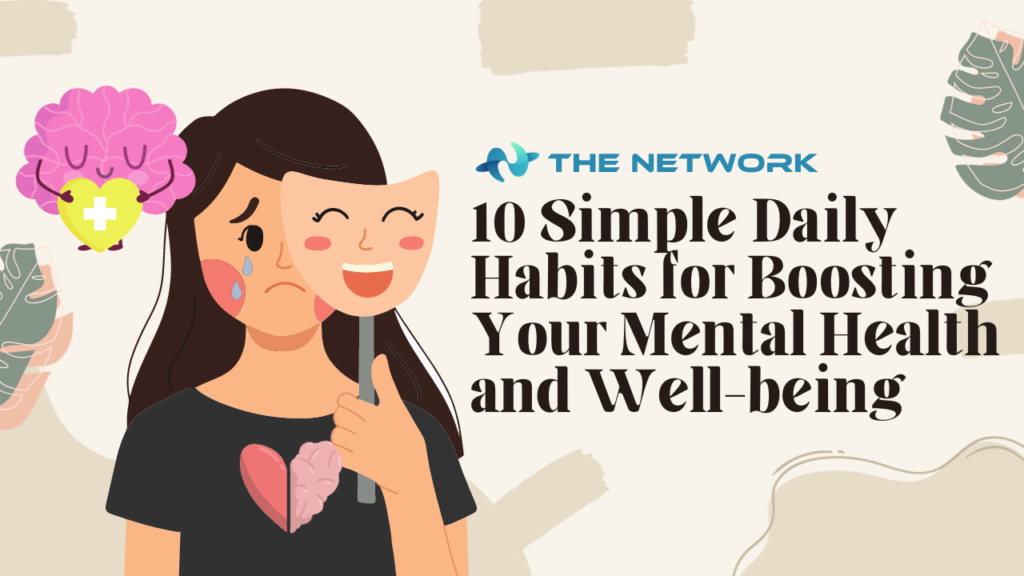10 Simple Daily Habits for Boosting Your Mental Health and Well-being

In today’s fast-paced world, mental health has emerged as a crucial aspect of our overall well-being. It’s not just about the absence of mental illness, but also about having a positive state of mind. This comprehensive guide explores the significance of mental wellness and provides practical strategies for enhancing mental health, aimed at a broad audience including high school students, homeschooling students, and parents.
What Is Mental Wellness?
Mental wellness goes beyond the absence of mental disorders. It involves a balanced state where individuals realize their abilities, cope with life’s normal stresses, work productively, and contribute to their community. It’s a state of internal equilibrium that is essential for living a fulfilling life.
Importance of Mental Health and Wellness
Good mental health is fundamental to maintaining good physical health, fostering effective relationships, and leading a productive life. It influences our thoughts, emotions, and behaviors, playing a vital role in how we handle stress, relate to others, and make decisions.
10 Simple Daily Habits for Boosting Your Mental Health
- Mindful Meditation: Dedicate a few minutes each day to mindful meditation. This practice helps in reducing stress, improving concentration, and fostering a sense of calm.
- Regular Exercise: Engage in physical activity daily. Exercise is not only good for the body but also boosts endorphins, which improve mood and reduce anxiety.
- Healthy Eating: Incorporate a balanced diet rich in nutrients. Good nutrition is key to brain health and can significantly impact your mental well-being.
- Adequate Sleep: Ensure you get enough restful sleep. Sleep plays a critical role in mental health, affecting mood, energy levels, and cognitive function.
- Social Connections: Maintain regular contact with friends and family. Strong social connections are essential for mental health, providing emotional support and reducing feelings of loneliness.
- Gratitude Journaling: Keep a gratitude journal and write down things you are thankful for each day. This habit can shift your focus from negative to positive aspects of life.
- Digital Detox: Limit screen time and take breaks from digital devices. Reducing exposure to social media and news can decrease stress and promote mental clarity.
- Learning and Creativity: Dedicate time to learning new things or engaging in creative activities. This stimulates the brain, provides a sense of accomplishment, and can be a great mood booster.
- Mindful Breathing: Practice deep, mindful breathing techniques. This can help calm the mind, reduce stress, and improve emotional regulation.
- Spending Time in Nature: Make time to be outdoors. Exposure to natural environments can be very therapeutic, reducing stress and improving overall well-being.
Personal Implications
Mentally healthy individuals are more likely to have a positive self-image, be resilient in the face of challenges, and maintain healthy relationships.
Social Implications
Strong mental health fosters a sense of community and connection. It enables individuals to contribute meaningfully to society and engage in positive interactions.
Professional Implications
In the workplace, good mental health translates to enhanced productivity, creativity, and the ability to work collaboratively.
Common Mental Health Problems and Treatment Options
Depression, anxiety, bipolar disorder, and ADHD are among the common mental health issues people face. Treatment options range from therapy and medication to lifestyle changes and support groups.
Debunking Myths About Mental Health
Myth: Mental health problems are a sign of weakness.
Truth: They are medical conditions that require appropriate care.
School or Homeschool Learning Ideas
- Mental Health Journaling: Encourage students to maintain a journal to express thoughts and feelings.
- Group Discussions: Foster an environment where students can openly discuss mental health topics.
- Role-Playing: Simulate real-life situations to teach coping strategies.
- Art Therapy Sessions: Use art as a medium to explore emotions.
- Physical Activity: Incorporate regular physical exercise into the curriculum to boost mental well-being.
What Our Children Need to Know
- Emotional Intelligence: Teach children to understand and manage their emotions.
- Empathy and Support: Encourage them to be supportive of peers facing mental health challenges.
- Self-Care: Educate about the importance of sleep, nutrition, and exercise.
The Big Questions
- How can we create a more inclusive environment for those with mental health challenges?
- What are the ways to balance technology use and mental well-being?
- How do cultural differences impact mental health perceptions?
- What role does social media play in shaping our mental health?
- How can mindfulness practices be incorporated into daily life?
Conclusion
Mental wellness is an integral part of our lives, impacting personal, social, and professional domains. By debunking myths and understanding common mental health problems, we can foster a more supportive and informed community. The key is to start conversations, implement practical learning ideas in schools, and empower our children with the knowledge they need.





Responses